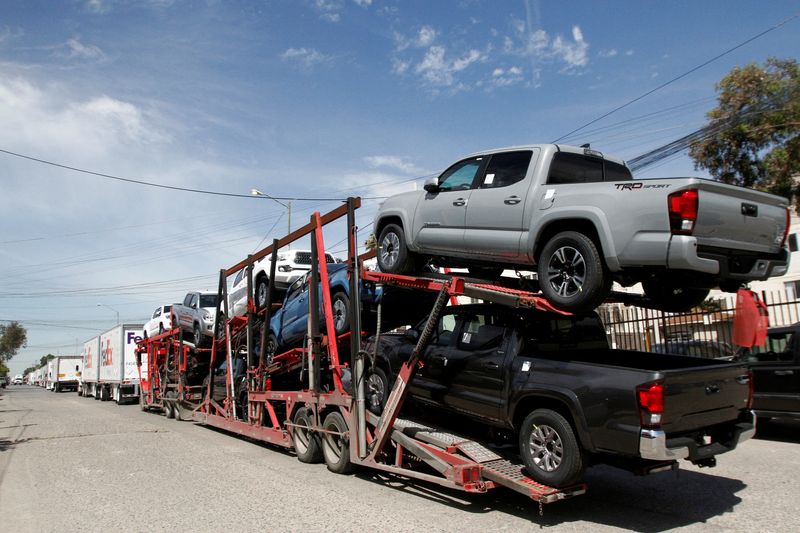By Lisa Baertlein
LOS ANGELES (Reuters) - President-elect Donald Trump's threatened tariffs on top trade partners China, Mexico and Canada would deal a blow to the $1.7 trillion U.S. transportation industry and worsen a nearly three-year trucking recession, sector experts said.
The industry that moves everything Americans make and buy is considered an economic bellwether, and will be among the first to signal any unintended consequences of trade policies that Trump says will help, not hurt, U.S. businesses.
"Tariffs like those proposed will raise prices, and higher prices mean less demand. Less demand equals less freight," said Jason Miller, interim chair of the department of supply-chain management at Michigan State University's business college.
Virtually every transportation company operating in the United States is exposed to tariff-related revenue downturns. The biggest include trucking and delivery firms J.B. Hunt Transport Services and United Parcel Service (NYSE:UPS) as well as railroad operators Canadian Pacific (NYSE:CP) Kansas City and Union Pacific (NYSE:UNP).
J.B. Hunt did not respond to requests for comment and UPS declined comment. The railroad operators said they were prepared to respond when and if tariffs come through.
Trump is keen to use tariffs to create jobs and raise revenue to replace that will be lost with planned tax cuts, even though those import levies would in effect serve as a new tax on consumers, whose spending represents the country's most powerful economic driver.
But he also appears to be using tariff threats to force U.S. trade partners to relent on nontrade issues like border security, economists and transportation executives said. China and other U.S. trade partners have not backed down, saying the tariffs would serve only to hurt all involved.
Trump has said he would slap tariffs of 25% on goods from Mexico and Canada unless those governments crack down on the flow of immigrants and fentanyl into the U.S. He has also vowed to add tariffs of at least 10% on top of what is already imposed on Chinese goods.
The United States is the world's No. 1 importer and No. 2 exporter. Trump's threatened tariffs would decrease flows in both directions, said Mary Lovely, a senior fellow of the Peterson Institute for International Economics, who studies the impact of the U.S.-China trade war.
"We expect that the new administration will get to work right away," said Lovely, who added that Trump's new tariffs could start hitting in the second or third quarters of next year.
TRUMP TARIFFS - THE SEQUEL
Trucking accounts for about one-third of U.S. transportation, more than any other sector.
Tariffs imposed by Trump during his previous term contributed to a trucking recession that lasted for most of 2019.
"We've seen this movie before, so we know how this plays out," said Dean Croke, principal analyst at DAT Freight and Analytics, which connects trucking firms with shippers.
"All I see is more disruption and tit-for-tat tariffs," Croke said, echoing a broadly held sentiment in transportation.
U.S. trucking is in a down cycle that has lasted nearly three years, the longest and deepest since the global financial crisis, said Michael Castagnetto, president of North American surface transportation at C.H. Robinson Worldwide (NASDAQ:CHRW).
Any new import levies are on a collision course with stubbornly flat industrial production - a crucial driver of domestic and international volume from sectors that include mining, manufacturing, chemicals and electricity - and lingering overcapacity from the COVID shipping boom, experts said.
Trump's new tariffs on Mexico and Canada, in particular, would hit one of the rare growth areas for trucking.
The value of cargo that moves between those countries and the U.S. - which includes finished vehicles, auto parts and avocados from Mexico as well as steel and lumber from Canada - reached $88.5 billion in September 2024, up 7.7% from the year-earlier, according to the U.S. Department of Transportation's Bureau of Transportation Statistics (BTS).
"Many of our customers – especially automotive customers – treat North America as one integrated supply chain, with some of their freight actually crossing both the Mexico and Canada borders," C.H. Robinson's Castagnetto said.
That interrelation makes the U.S. vulnerable to retaliatory tariffs.
TRANS-BORDER TRADE
Trump's tariff threats could also derail railroad company plans to switch from cost-reductions and efficiency efforts to growth, said independent railroad analyst Anthony Hatch.
North American trans-border rail freight was $17 billion in September, down 5.4% from the year earlier, according to BTS data, but remains an opportunity for the industry.
Canadian Pacific bought Kansas City Southern (NYSE:KSU) for $31 billion in 2021, merging the companies into an entity known as CPKC and creating the first railway to link Canada, the United States and Mexico. The merged companies aimed to capitalize on China's factory expansion in Mexico, which recently overtook China as the No. 1 U.S. trade partner.
"While there was rhetoric and headlines, ultimately free trade in North America increased significantly during the first Trump term and a new free trade agreement was established," a CPKC spokesman said.

Union Pacific, which covers much of the U.S. West, also has connections to and investments in Mexico.
"If it slows down, we have the capability to remove a lot of costs," Union Pacific CEO Jim Vena said at a recent investor conference, referring to any tariff-related demand downturn.